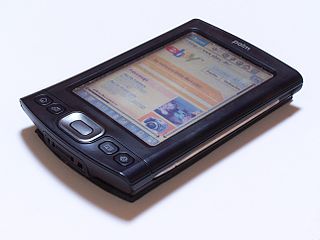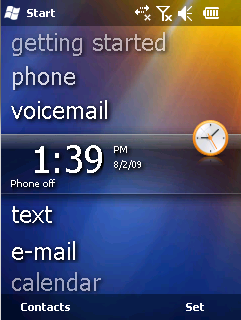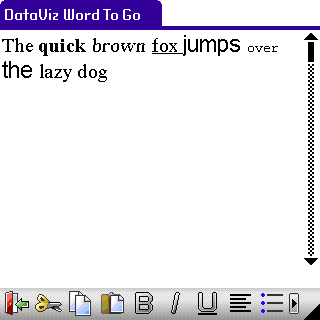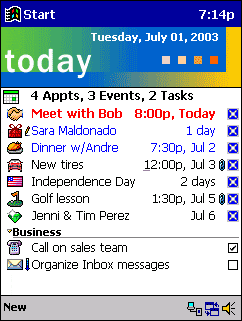
A personal digital assistant (PDA), also known as a handheld PC, is a variety mobile device which functions as a personal information manager. PDAs have been mostly displaced by the widespread adoption of highly capable smartphones, in particular those based on iOS and Android.
Java Platform, Micro Edition or Java ME is a computing platform for development and deployment of portable code for embedded and mobile devices. Java ME was formerly known as Java 2 Platform, Micro Edition or J2ME. As of December 22, 2006, the Java ME source code is licensed under the GNU General Public License, and is released under the project name phoneME.

A Pocket PC is a class of personal digital assistant (PDA) that runs the Windows Mobile or Windows Embedded Compact operating system that has some of the abilities of modern desktop PCs. The name was introduced by Microsoft in 2000 as a rebranding of the Palm-size PC category. Some of these devices also had integrated phone and data capabilities, which were called Pocket PC Phone Edition or simply "Smartphone".
Windows Embedded Compact, formerly Windows Embedded CE, Windows Powered and Windows CE, is an operating system subfamily developed by Microsoft as part of its Windows Embedded family of products.

Windows Mobile was a family of mobile operating systems developed by Microsoft for smartphones and personal digital assistants.

ActiveSync is a mobile data synchronization app developed by Microsoft, originally released in 1996. It synchronizes data with handheld devices and desktop computers. In the Windows Task Manager, the associated process is called wcescomm.exe.

Internet Explorer Mobile is a mobile version of Internet Explorer developed by Microsoft, based on versions of the MSHTML (Trident) layout engine. IE Mobile comes loaded by default with Windows Phone and Windows CE. Later versions of Internet Explorer Mobile are based on the desktop version of Internet Explorer. Older versions however, called Pocket Internet Explorer, are not based on the same layout engine.

The Core Pocket Media Player (TCPMP) is a software media player which operates on portable devices and Windows-based PCs. It is discontinued, but still available from the official mirror site. Supported operating systems include Palm OS, Symbian OS, and Microsoft Windows, CE, and Mobile. It is also available on Microsoft's Zune HD via a hack called Liberate. TCPMP also has hardware accelerated playback for ATI and Intel 2700G mobiles, such as the Tapwave Zodiac and Dell Axim X50v/X51V.

Documents To Go is BlackBerry's cross-platform office suite for Palm OS, Windows Mobile, Maemo, BlackBerry OS, Symbian, Android, and iOS. Also, a larger-screen version would have been included with the Palm Foleo, but Palm, Inc. cancelled the device before its release. The desktop tool, which provides document synchronization between one's handheld device and one's computer, is available for both Microsoft Windows and Mac OS X. On 8 September 2010, it was announced that DataViz had sold the program along with other business assets to Research In Motion for $50 million.

Opera Mobile is a mobile web browser for smartphones, tablets and PDAs developed by Opera.

Pocket PC 2002, originally codenamed "Merlin", was a member of the Windows Mobile family of mobile operating systems, released on October 4, 2001. Like Pocket PC 2000, it was based on Windows CE 3.0.
A mobile operating system is an operating system for mobile phones, tablets, smartwatches, smartglasses, or other non-laptop personal mobile computing devices. While computers such as typical laptops are "mobile", the operating systems used on them are generally not considered mobile ones, as they were originally designed for desktop computers that historically did not have or need specific mobile features. This line distinguishing mobile and other forms has become blurred in recent years, due to the fact that newer devices have become smaller and more mobile unlike hardware of the past. Key notabilities blurring this line are the introduction of tablet computers and light-weight laptops and the hybridization of the two in 2-in-1 PCs.
iSilo is a document reader available for Palm OS, Pocket PC, Windows Mobile Smartphone, Symbian UIQ, Symbian S60, and Windows CE Handheld PC handhelds, Windows computers as well as Apple iPhone, Android, Windows Phone 7 and HP webOS smartphones. iSilo has direct support for reading these document types: iSilo 4.x, iSilo 3.x, iSilo 2.x, Palm Doc, and plain text files (.txt). However it has largely fallen out of use due to its one-way nature — documents can be converted to iSilo format, but not back out for editing. Other formats, such as EPUB, use open standards, are easily edited or converted, and achieve similar compression rates.
NS Basic is a family of development tools developed and commercially marketed by NSB Corporation in Toronto, Ontario, Canada for iOS, Android, Microsoft Windows, MacOS, Linux, BlackBerry OS, WebOS, Newton OS, Palm OS, Windows CE and Windows Mobile.

webOS, also known as LG webOS and previously known as Open webOS,HP webOS and Palm webOS, is a Linux kernel-based multitasking operating system for smart devices such as smart TVs that has also been used as a mobile operating system. Initially developed by Palm, Inc., HP made the platform open source, at which point it became Open webOS.

MoSync is a discontinued free and open-source software development kit (SDK) for mobile applications. It is integrated with the Eclipse development environment. The framework produces native mobile applications for multiple platforms using C/C++, HTML5 scripting and any combination thereof. The target group for MoSync are both web developers looking to enter the mobile space, as well as the ordinary PC/Mac desktop developer with knowledge in C/C++ development.

Symbian is a discontinued mobile operating system (OS) and computing platform designed for smartphones. It was originally developed as a proprietary software OS for personal digital assistants in 1998 by the Symbian Ltd. consortium. Symbian OS is a descendant of Psion's EPOC, and was released exclusively on ARM processors, although an unreleased x86 port existed. Symbian was used by many major mobile phone brands, like Samsung, Motorola, Sony Ericsson, and above all by Nokia. It was also prevalent in Japan by brands including Fujitsu, Sharp and Mitsubishi. As a pioneer that established the smartphone industry, it was the most popular smartphone OS on a worldwide average until the end of 2010, at a time when smartphones were in limited use, when it was overtaken by iOS and Android. It was notably less popular in North America.

Infinite Dreams Inc. or Infinite Dreams is a game development studio in Gliwice, Poland. Founded in 2002, the company develops games for a range of digital platforms such as iOS, Android, macOS, Windows Phone and Symbian. The studio is best known for its Sky Force series. Games developed by Infinite Dreams have been downloaded over 25,000,000 times worldwide.

Pocket PC 2000 was the first member of the Windows Mobile family of mobile operating systems that was released on April 19, 2000, and was based on Windows CE 3.0. It is the successor to the operating system aboard Palm-size PCs. Backwards compatibility was retained with such Palm-size PC applications.










